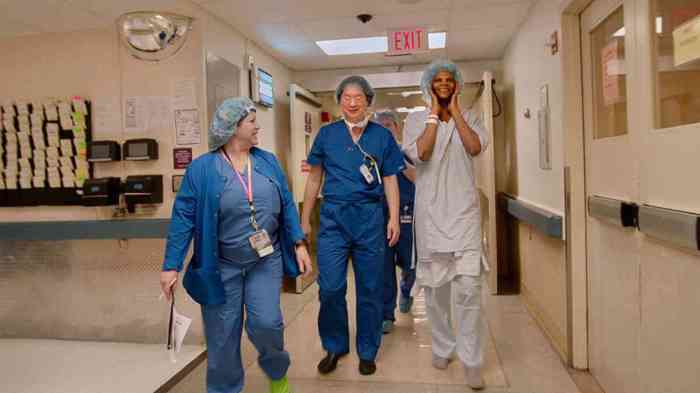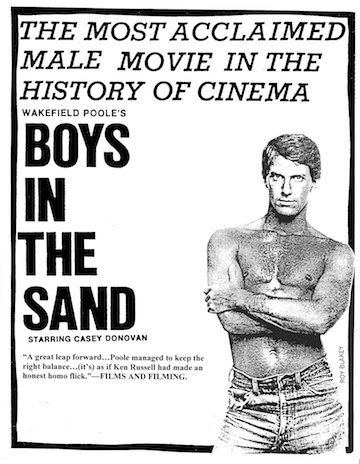BY DAVID EHRENSTEIN | “Oh where is the leather-clad motorcyclist who will sweep me away?,” Lindsay Anderson moaned rhetorically in his diaries. It’s a shame the great film and stage director never met Oliver Sacks. Both British, with only a 10-year age difference between them, they might well have clicked.
But Sacks, the neurologist and author — whose books on brain-function oddities, “Awakenings” (1973), “Musicophilia” (2007), and (most famous of all) “The Man Who Mistook His Wife For a Hat” (1985), have brought him fame among those with no familiarity with what it is he is discussing — has reached a new plateau with his new memoir “On the Move: A Life.” In it, the good doctor emerges as both a dedicated man of science and the gay bike-riding bon vivant as well. A fortiori, in simply and honestly recounting his life, Sacks has something important to say about what it means to be gay.
Like his fellow forthrightly gay Brit David Hockney, Sacks came to terms rather handily with his sexuality, despite coming of age in a Great Britain where being “a homosexual” could put one in prison. Anderson on the others hand, like far too many gay men of his era, was quite a different story. He could find no sexual solace in actual life, only in the fantasy of his masterpiece “if…” (1968), in which Malcolm McDowell memorably swipes a motorcycle while his classmate Richard Warwick (gay and out in real life, and briefly un amour de Larry Kramer) falls in love with a younger student (the lovely Rupert Webster), whom he woos with a demonstration of gymnastic skill.
Famed neurologist exchanged his white coat by nightfall for motorcycle leathers
But as charming as Anderson’s fantasy may be, Sack’s reality is even better. Especially in light of his near-heroic matter-of-factness about being gay: “I was not too aware of what was going on all around me — or inside me — I had no crushes on anyone at school (although I was turned on by the full-size reproduction, at the head of the stairway, of the famous statue of the beautifully muscled, naked Laocoon, trying to save his sons from the serpents).” Hence, “coming out” to his parents proceeded this way: “‘You don’t have many girlfriends,’ [his father] said. ‘Don’t you like girls?’ ‘They’re alright,’ I answered, wishing the conversation would stop. ‘Perhaps you prefer boys?’ he persisted. ‘Yes, I do — but it’s just a feeling — I have never “done” anything,’ and then I added fearfully, ‘Don’t tell Ma — she won’t be able to take it.’ But my father did tell her, and the next morning she came down with a face of thunder, a face I had never seen before. ‘You are an abomination,’ she said. ‘I wish you had never been born.’ Then she left and did not speak to me for several days.’”
Sacks’ mother eventually came around. So much so that at the last he declares, “My mother’s death was the most devastating loss of my life.” But, as Sacks discovered, the reason for her initial reaction stemmed from his brother Michael’s schizophrenia. She had “lost” one son to mental illness, now “homosexuality” signaled to her the “loss” of another as well. “Homosexuality” was classified as a “neurosis” in those days but also legally outlawed, thus creating a thriving blackmail business that the 1961 Dirk Bogarde-starred drama “Victim” exposes with great insight. Sacks never encountered such problems.
Not that it was always easy, as he first fell in love with a man named Richard Selig: “I fell in love with his face, his body, his mind, his poetry, everything about him.” He tells Selig, who replies, ‘I know. I am not that way, but I appreciate your love and love you too, in my own way.’” Selig marries and, alas, dies 15 months afterwards from a lymphosarcoma Sacks himself had diagnosed.
Sack got himself sorted out initially in Amsterdam where he had sex with another man despite being dead drunk. “Was it nice?” he asks his one-nighter. “Yes, very nice,” he’s told, with the proviso, “There is no need to get dead drunk, pass out, and lie in the gutter. This is a very sad — even dangerous — thing to do. I hope you will never do it again.”
Oliver Sacks at Oxford in 1953. | KNOPF
Happily, back in the UK, Sacks had better luck in Soho, where through a bulletin board in a bookstore on Old Compton Street he made contact with a fellow motorcycle enthusiast who he could tell from the posting was gay. They began a relatively uncomplicated affair — bike riding, dinners, hanging out, and lots of uninhibited sex. But then Sacks got an offer to “jump the pond” and work in Canada and then the States. He informed his casual lover of his plans and when he heard back from him, “I felt stricken when I received his letter and realized, too late, that he must have fallen in love with me and that now I had broken his heart.”
Sacks’ own heart was a lot lighter in the US, when — settling in San Francisco — he discovers the joys of living at the Y: “Around 11:00 p.m., there was a soft knock on my door. I said ‘Come in,’ the door was not locked. A young man put his head around the door and, seeing me, exclaimed, ‘Sorry I’ve got the wrong room.’ ‘Don’t be too sure,’ I answered, hardly believing what I was saying. ‘Why don’t you come in?’ He looked uncertain for a moment and then came in, locking the door behind him… I had a peculiar feeling of freedom. I was no longer in London, no longer in Europe, this was the New World and — within limits — I could do what I wanted.”
What Sacks wanted took many forms. Professionally, he found he was able to make all sorts strides in neurology, most markedly with “post-encephalitic Parkinsonism” patients, suffering from a nerve disease whose visible manifestations are both erratic movements and complete stillness. Describing her condition, “Frances A,” one of Sack’s patients, said, “I don’t just come to a halt, I am still going, but I have run out of space to move in… You see, my space, our space, is nothing like your space: our space gets bigger and smaller, it bounces back on itself, and it loops itself round till it runs into itself.”
Sacks’ experiments with the drug “L-dopa” brought relief to such patients, allowing them to engage with the world in ways he explains in “Awakenings,” memorably made into a dramatic film in 1990, directed by Penny Marshall and starring Robert De Niro as a patient named Leonard Lowe and Robin Williams as Dr. Malcolm Sayer.
The film is not a biopic for reasons Sacks had much to do with. When the project began, with Peter Weir set to direct, screenwriter Steven Zaillian fashioned a script that included a doctor-patient love story (heterosexual of course). Sacks nixed that immediately, and in the new script Zaillian completed for Marshall such notions were not only excised but all that ended up remaining of Sacks himself sprang from Williams’ uncanny mimicking abilities. Sacks was on the set throughout the shoot and he and Williams became good friends.
“On the Move” was doubtless at the printers when Williams tragically took his own life, with reports he suffered from Lewy body dementia. There’s no way of knowing if Sacks could have preventively intervened if he’d known Williams’ condition. He was unable to prevent a seriously depressed Spaulding Gray from suicide, despite their friendship. In reading “On the Move,” one can see Sacks’ understanding of both his and others’ abilities and limitations in situations dire or commonplace.
Writing of “Mel,” a fellow bodybuilder he befriended at Muscle Beach in Venice, California and came to live with during his time as a weight-lifting enthusiast who specialized in “squat lifts,” he notes, “Evenings were a strain. I found it difficult to concentrate and was very conscious, almost hyperaware, of Mel’s physical presence, not the least his virile animal smell, which I loved. Mel liked being massaged and would lie naked face down on his bed and ask me to massage his back. I would sit astride him, wearing my training shorts, and pour oil on his back — neat’s-foot oil, which we used to keep our motorbike leathers supple — and slowly massage his shapely, powerful back muscles. He enjoyed this, relaxing and surrendering to my hands, and I enjoyed it too; indeed, it would bring me to the brink of orgasm. The brink was okay — just; one could pretend that nothing special was happening. But on one occasion, I could not contain myself and spurted semen all over his back. I felt him suddenly stiffen when this happened and without a word got up and had a shower. The next morning Mel said tersely, ‘I have to move out, find a place of my own.’ I said nothing but felt close to tears.”
The two men kept in touch over the years, with Sacks aware that Mel “was not fully at ease with his own sexuality and longed for physical contact with me, where I had, so far as sex was concerned, given up my illusions and hopes about him. Mel’s almost disgusted rejection affected me deeply, depriving me (so I felt) of all hope for a real love life, driving me inwards and downwards to seek whatever satisfactions I could find with drug-fueled fantasy and pleasure.”
Sacks did not travel this full descent, but he did turn to drugs. His overindulgence in chloral hydrate resulted in hallucinations, and for a time amphetamines were his drug of choice — the use of which played a key role in a love affair that began on a visit to Amsterdam: “I met a young German theater director called Karl. He was elegantly dressed and articulate; he spoke with wit and knowledge about Bertolt Brecht, many of whose plays he had directed. I thought him charming and civilized but did not think of him as especially attractive in sexual terms and gave no thought to him when I returned to London.”
On Karl suggestion, the two later meet in France: “We divided our long weekend in Paris between sightseeing and lovemaking. I had bought a cache of amphetamines with me and downed 20 tablets or so before we went to bed. Hit with excitement and desire, which I had not felt before taking the tablets, I made love ardently.” Karl took them, as well. “That we might thrash about like two animals in rut was perhaps not wholly surprising given the circumstances plus the amphetamine. But what I did not expect was that this experience would cause us to fall in love with each other.”
Eventually the affair cooled, though they continued to correspond by mail. “But then the feeling started to fade. We asked ourselves whether the experience we had shared was real,” given the drugs. “In November we oscillated between doubt and affirmation… By December we were out of love.” Sacks wrote to Karl, “I have memories of a fevered joy, intense, irrational… totally gone.” By then, Karl had become a druggie, living in a squalid apartment at the end of Christopher Street. “I heard, in the 1980s, that he was ill with AIDS and had gone back to Germany to die.”
Sacks in 1956. | KNOPF
For his part, Sacks was lucky when it came to the epidemic. In London in 1971, he met a young American, while swimming at Hampstead Heath (he’d made a grab at Sack’s junk). “We had a joyous week together— the days full, the nights intimate, a happy, festive, loving week — before he had to return to the States. There were no deep organized feelings, we liked each other, we enjoyed ourselves, and we parted without pain or promises when our week was up. It was just as well that I had no foreknowledge of the future, for after that sweet birthday fling I was to have no sex for the next 35 years.”
There’s a special beauty in this passage. The ability gay men have to enjoy “casual sex” is one of the treasures of our lives. That AIDS turned this joy to despair is, of course, a tragedy whose depths have yet to be fully plumbed. But the fact that Sacks found himself sexually uninvolved for 35 years is no uncommon thing. We are thought of by our enemies as monsters of sex — rutting wildly 24/ 7.Yet that is not at all the case, as Sacks demonstrates.
His long abstinence wasn’t by design; in many ways, it was a matter of temperament: “I am shy in ordinary social contexts, I am not able to ‘chat’ with any ease. I have difficulty recognizing people (this is lifelong though worse now my eyesight impaired), I have little knowledge of and little interest in current affairs, whether political, social, or sexual. Now, additionally, I am hard of hearing, a polite term for deepening deafness. Given all this, I tend to retreat into a corner, to look invisible, to hope I am passed over. This was incapacitating in the 1960s when I went to gay bars to meet people; I would agonize, wedged into a corner, and leave after an hour, alone, but somehow relieved. But if I find someone, at a party or elsewhere, who shares some of my own (usually scientific) interests — volcanoes, jellyfish, gravitational waves, whatever — then I am immediately drawn into animated conversation (though I still may fail to recognize the person I am talking to a moment later).”
One incident beautifully captures Sacks’ social awkwardness: “Passing by a bar in my neighborhood, I was struck by the range of colored lights within, and pressed my spectroscope against the window to examine them. It became obvious, however, that the patrons inside were disquieted by this odd behavior, my gaping at them (as they thought) with a peculiar little instrument, so I strode in boldly — it was a gay bar — and said, ‘Stop talking about sex everyone! Have a look at something really interesting.’ There was a dumbfounded silence, but again, my childish, ingenuous enthusiasm won the day, and everyone started passing the spectroscope hand to hand, making comments like, ‘Wow — cool!’ After everyone had had a turn with the spectroscope it was handed back with thanks. Then they all resumed talking about sex again.”
In 2008, Sacks met Billy Hayes, author of several books including “The Anatomist” about the creation of “Grey’s Anatomy”: “Timid and inhibited all my life, I let a friendship and intimacy grow between us perhaps without fully realizing its depth.” Only while recuperating from knee and back surgery, he explains, “did I realize how deep it was… I was in my seventy-seventh year… We have a tranquil, many-dimensional sharing of lives — a great and unexpected gift in my old age, after a lifetime of keeping at a distance.”
Sachs in 2010. | KNOPF
That intimacy has doubtless been of incalculable solace to Sacks, who in a New York Times article this February announced, “A few weeks ago I learned that I have multiple metastases in the liver. Nine years ago it was discovered that I had a rare tumor of the eye, an ocular melanoma. The radiation and lasering to remove the tumor ultimately left me blind in that eye. But though ocular melanomas metastasize in perhaps 50 percent of cases, given the particulars of my own case, the likelihood was much smaller. I am among the unlucky ones. I feel grateful that I have been granted nine years of good health and productivity since the original diagnosis, but now I am face to face with dying. The cancer occupies a third of my liver, and though its advance may be slowed, this particular sort of cancer cannot be halted.
“I have been increasingly conscious, for the last 10 years or so, of deaths among my contemporaries. My generation is on the way out, and each death I have felt as an abruption, a tearing away of part of myself. There will be no one like us when we are gone, but then there is no one like anyone else, ever. When people die, they cannot be replaced. They leave holes that cannot be filled, for it is the fate — the genetic and neural fate — of every human being to be a unique individual, to find his own path, to live his own life, to die his own death… I cannot pretend I am without fear. But my predominant feeling is one of gratitude. I have loved and been loved.”
For a gay man of Sacks’ time, who has made such a remarkable contribution to understanding the seemingly ineffable, that is no small affair. The book leaves an image of Sacks dominated by the picture on its cover, with him noting of the most joyous period of his life when he was known as Wolf: “This corresponded to a certain duplicity I felt in myself, which I thought of in part as a need to have different wolves for day and night. By day I would be the genial, white-coated Dr. Oliver Sacks, but by nightfall I would exchange my white coat for my motorcycle leathers, and, anonymous, wolf-life, slip out of the hospital to rove the streets or mount the sinuous curves of [Marin County’s] Mount Tamalpais and then race along the moonlit road to Sunset Beach or Bodega Bay.”
His friend, the great gay poet Thom Gunn, put it best in the poem whose title Sacks “sampled” for his own:
“On motorcycles, up the road, they come:
Small, black, as flies hanging in heat, the Boys,
Until the distance throws them forth, their hum
Bulges to thunder held by calf and thigh.
In goggles, donned impersonality,
In gleaming jackets trophied with the dust,
They strap in doubt — by hiding it, robust —
And almost hear a meaning in their noise.”
Indeed.
ON THE MOVE: A LIFE | By Oliver Sacks | Knopf | $27.95; 416 pages





































